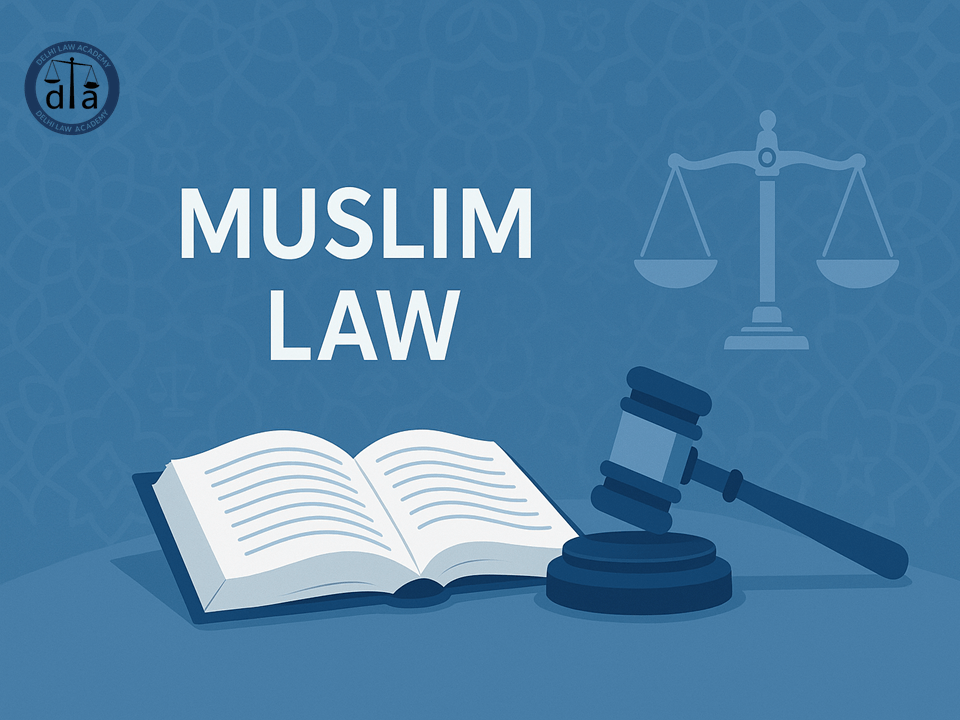
📚 Preparation for RJS, DJS, PCS (J) and Other Judicial Service Exams
⚖️ VALIA KATHEESSA UMMA v. PATHAKKALAN KUNHAMU [1964 SC]
- 💠 Muhammadan law of gifts attaches great importance to possession or seisin of the property gifted (Kabz-ul-Kamil) especially of immovable property.
- 💠 A gift (Hiba) is the conferring of a right of property in something specific without an exchange (ewaz). The word (Hiba) literally means the donation of a thing from which the donee may derive a benefit.
- 💠 The transfer must be immediate and complete, (tamlik-ul-ain) for the most essential ingredient of Hiba is the declaration “I have given”.
****************
Muslim Law is an important component of most Judicial Service exams in the country. Its thorough knowledge is a must for all aspirants of RJS, DJS, PCS (J) and other Judicial Service exams. To help such aspirants, DELHI LAW ACADEMY JAIPUR has launched a series of study material modules on all important aspects of this important part of their syllabus:
******************
📖 Valia Katheessa Umma v. Pathakkalan Kunhamu [1964 SC]
This appeal by special leave by Defendants 1 to 3 raises an important question under the Muhammadan Law, which may be stated thus:
“Is a gift by a husband to his minor wife and accepted on her behalf by her mother valid?”
One Mammotty was married to Seinaba and he made a gift of his properties including immovable property to Seinaba on April 7, 1944 by a registered deed. Mammotty died on May 3, 1946 without an issue. Seinaba also died soon afterwards on February 25, 1947, without leaving an issue. At the time of the gift Seinaba was 15 years 9 months old. It appears that Mammotty was ill for a long time and was in hospital and he was discharged uncured a month before the execution of the gift deed and remained in his mother-in-law’s house afterwards. There are conflicting versions about the nature of the disease and a plea was taken in the case that the gift was made in contemplation of death and was voidable. This plea need not detain us because the trial Judge and the first appellate Judge did not accept it.
A gift (Hiba) is the conferring of a right of property in something specific without an exchange (ewaz). The word (Hiba) literally means the donation of a thing from which the donee may derive a benefit. The transfer must be immediate and complete, (tamlik-ul-ain) for the most essential ingredient of Hiba is the declaration “I have given”. Since Muhammadan law views the law of gifts as a part of the law of contract there must be a tender (ijab) and an acceptance (qabul) and delivery of possession (qabza). There is, however, no consideration and this fact coupled with the necessity to transfer possession immediately distinguishes gifts from sales.
In the present case there is a declaration and a tender by the donor Mammotty and as the gift is by a registered deed no question in this behalf can arise. Insofar as Mammotty was concerned there was delivery of possession and the deed also records this fact. Possession was not delivered to Seinaba but to her mother, the first appellant, and she accepted the gift on behalf of Seinaba. Mammotty could have made a declaration of gift and taken possession on behalf of his wife who had attained puberty and had lived with him, for after the celebration of marriage a husband can receive a gift in respect of minor wife even though her father be living.
But Mammotty did not complete his gift in this way. His gift included immovable properties and it was accepted by the mother who took over possession on behalf of her minor daughter. A gift to a minor is completed ordinarily by the acceptance of the guardian of the property of the minor (Wilayat-ul-Mal). A mother can exercise guardianship of the person of a minor daughter (Hizanat) till the girl attains puberty after which the guardianship of the person is that of the father if the girl is unmarried and that of the husband if she is married and has gone to her husband. Even under the Guardian and Wards Act, the husband is the guardian of the person after marriage of a girl unless he is considered unfit. The mother was thus not the guardian of the person of Seinaba.
Seinaba’s mother was also not a guardian of the property of Seinaba. Muhammadan law makes a distinction between guardian of the person, guardian of the property and guardian for the purpose of marriage (Wilayat-ul-Nikah) in the case of minor females. Guardians of the property are father and grandfather but they include also executors (Wasi) of these two and even executors of the executors and finally the Kazi’s executor. None of these were in existence except perhaps the civil court which has taken the place of the Kazi.
The question is whether possession can be given to the wife’s mother when the gift is from the husband to his minor wife and when the minor’s father and father’s father are not alive and there is no executor of the one or the other.
Rules on the subject may first be recapitulated. It is only actual or constructive possession that completes the gift and registration does not cure the defect nor is a bare declaration in the deed that possession was given to a minor of any avail without the intervention of the guardian of the property unless the minor has reached the years of discretion. If the property is with the donor he must depart from it and the donee must enter upon possession.
In our judgment the gift in the present case was a valid gift. Mammotty was living at the time of the gift in the house of his mother-in-law and was probably a very sick person though not in Marzulmaut. His minor wife who had attained discretion was capable under Muhammadan law to accept the gift, was living at her mother’s house and in her care where the husband was also residing. The intention to make the gift was clear and manifest because it was made by a deed which was registered and handed over by Mammotty to his mother-inlaw and accepted by her on behalf of the minor.
There can be no question that there was a complete intention to divest ownership on the part of Mammotty and to transfer the property to the donee. If Mammotty had handed over the deed to his wife, the gift would have been complete under Muhammadan law and it seems impossible to hold that by handing over the deed to his mother-in-law, in whose charge his wife was during his illness and afterwards Mammotty did not complete the gift. In our opinion both on texts and authorities such a gift must be accepted as valid and complete.
**********
📚 Continue Your Muslim Law Preparation
Don’t stop here! Strengthen your knowledge of Muslim Law with our blogs:
📘 Free Study Material for Judiciary Aspirants!
Download our FREE study material prepared by Delhi Law Academy’s expert faculty.
❓ FAQs: Valia Katheessa Umma v. Pathakkalan Kunhamu [1964 SC]
A gift (Hiba) confers a right of property in something specific without any exchange (ewaz). The transfer must be immediate and complete, and the essential declaration is “I have given”. Possession (Kabz-ul-Kamil) is critical, especially for immovable property.
Under Muhammadan law, a gift to a minor is valid if accepted by a guardian of her property. In this case, the mother accepted the gift on behalf of her minor daughter, which is considered valid when the minor has attained discretion.
The key requirements are:
1. Declaration (I have given),
2. Tender (Ijab) and acceptance (Qabul),
3. Delivery of possession (Qabza). Consideration is not required, distinguishing it from a sale.
No. Registration records the deed but does not complete the gift without actual or constructive delivery of possession to the donee or her guardian.
Guardians are categorized as:
• Guardian of the person,
• Guardian of the property,
• Guardian for marriage (Wilayat-ul-Nikah). Typically, the father or grandfather acts as property guardian, and the mother may act as guardian of the person until puberty.
Yes. The gift was made with clear intention, delivered to the mother acting for the minor daughter, and accepted on behalf of the daughter. Texts and authorities confirm that this completed the Hiba under Muhammadan law.
Contact us
📍 Delhi Law Academy – Jaipur Branch
6C, Tower 2, Coaching Hub, Pratap Nagar, Jaipur – 302033
📞 Phone:
+91 9911916552
+91 8447285606
✉️ Email:
contactus@delhilawacademy.com

